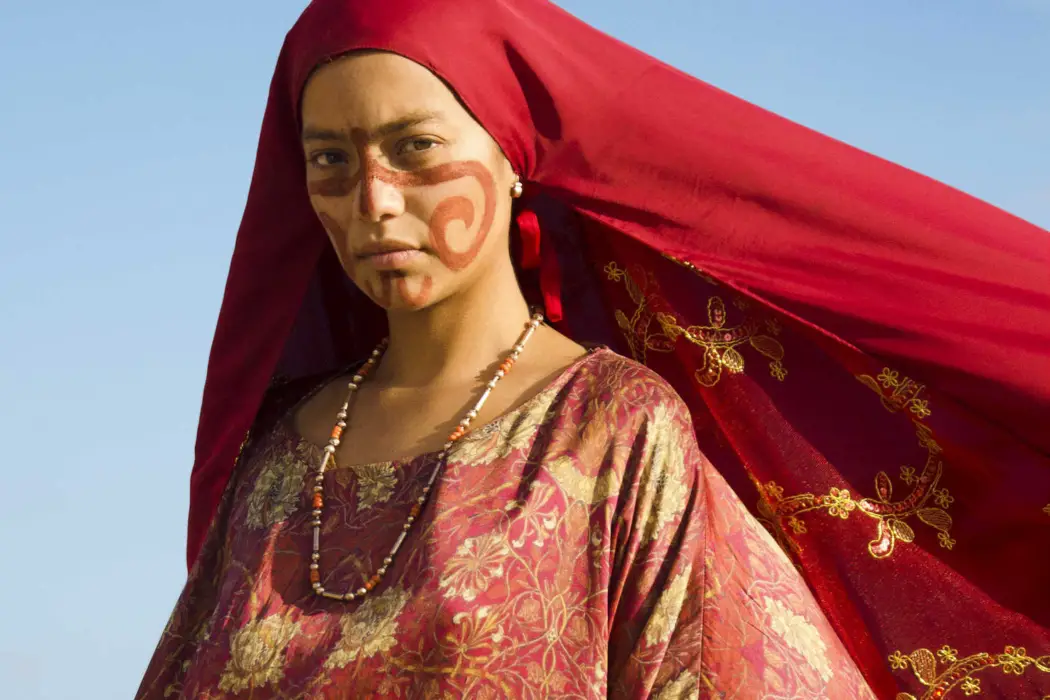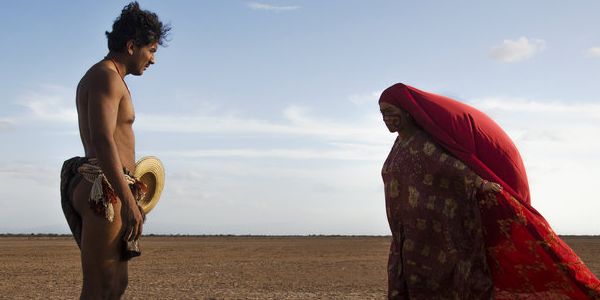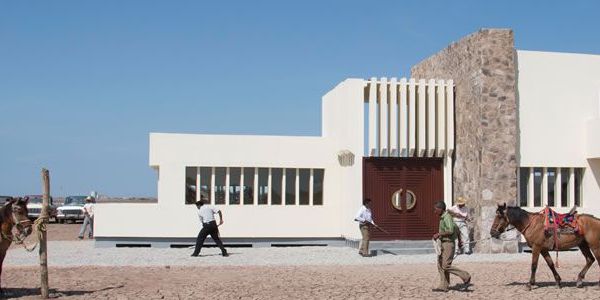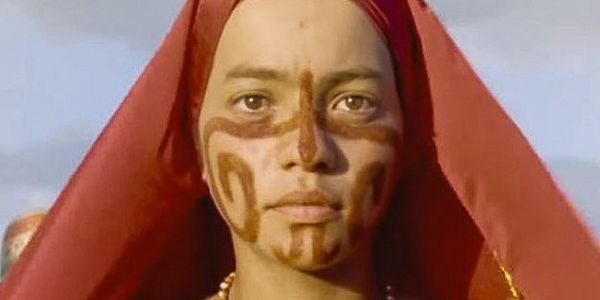The Genre-Busting Power Of BIRDS OF PASSAGE

Andrew Emerson is a University of Chicago student. His high…
Ciro Guerra and Cristina Gallego’s Birds of Passage takes us to the Guajira Peninsula, a desert region in northern Colombia that also serves as the home of the indigenous Wayuu people. At the film’s start, a Wayuu clansman named Raphayet (José Acosta) wants to marry a fellow clanswoman named Zaida (Nathalie Reyes). Unfortunately, Zaida’s family, particularly her mother Úrsula (Carmiña Martínez), doesn’t take to him, and as a result, they demand that Raphayet pay an unusually hefty dowry. In order to meet their request, Raphayet decides to get into the drug trade – a decision that ends up carrying tragic consequences for him, Zaida, and everyone else in their community.
Given that Birds of Passage deals with the drug trade and organized crime, both its supporters and detractors have frequently compared it to better-known crime movies in the English language. In The Guardian, for instance, Jordan Hoffman approvingly noted that the film gets “into Scarface territory,” while “the numerous weddings, funerals and other ritualistic gatherings evoke the Godfather saga.” Conversely, Mike D’Angelo of The A.V. Club complained about the film’s familiarity, asserting that it simply rehashes “the same illicit business model recently seen in such films as American Made and Loving Pablo.”
Family and Crime
If you were just going by the above summary of Birds of Passage’s plot, these comparisons would certainly seem reasonable. Yet despite its apparent similarities to its many genre forebears, Guerra and Gallego’s work ultimately differs from them in two meaningful ways. To start, American crime movies often cast the relationship between family and crime in a positive light. For instance, in The Godfather, the crime movie par excellence, the Corleones’ criminal dealings don’t weaken their sense of family. On the contrary: as highlighted by Michael’s famous injunction to Fredo (“Don’t ever take sides against the family”), the two things are compatible, and it could even be said that the former heightens the latter.

In contrast to this, however, Birds of Passage places family and crime in fundamental opposition to one another. On the one hand, Gallego and Guerra associate the former with tradition, linking it with a rustic, ritual-based worldview that’s both spiritually and emotionally fulfilling. Conversely, crime is associated with modernity – the disruptive sound of cars, the impersonal transactionalism of capitalism, and the intrusive presence of non-Wayuu outsiders (or alijunas, as they’re derisively referred to in Wayuu throughout the film).
The gist of Birds of Passage’s narrative is that these two concepts – tradition-respecting family, profit-oriented crime – exist in a corrosive relationship. Over the course of the film, Raphayet becomes more and more embedded in the drug business. As he does so, however, he not only becomes estranged from his wife and family, but he also finds himself breaking Wayuu traditions more and more often – all for the sake of maintaining a profitable enterprise. By the film’s end, he and almost everyone else he knows are dead, leaving a lone shepherd to lament the damage that “greed” (read: money and crime) wreaked upon the Wayuu way of life.
This overarching theme of the narrative, moreover, finds apt visual expression in Raphayet’s house. After he becomes rich from his drug dealings, Raphayet decides to build a home for himself and his family. As shown in the image above, it’s a sleek, elegantly simplistic white mansion that readily testifies to Raphayet’s heightened socioeconomic status. But the building’s worldly sophistication forms a stark contrast with its surroundings – namely, the barren desert and haphazardly constructed huts that Raphayet’s family and ancestors once thought of as home. In that sense, the elaborateness of Raphayet’s mansion – a symbol for his professional pursuits – intrinsically clashes with the Wayuu’s desert home, which conversely could be seen as a symbol for family and tradition.

On the whole, then, the message that Birds of Passage advances couldn’t be more different from the one that you get in films like The Godfather. Far from encouraging solidarity, crime only brings discord, distrust, and unhappiness to Raphayet and his Wayuu family. To put it another way, just as Raphayet’s drug-funded mansion seems completely out of place in the Wayuu’s desert home, Raphayet’s professional pursuits are depicted as being inherently incompatible with his domestic ones. In contrast to its predecessors, Birds of Passage thus has a much more expansive – and pessimistic – understanding of the damage that crime can inflict.
Attitudes Towards Violence
From here, Birds of Passage is also distinguished by its attitude towards violence. Traditionally, after all, crime movies tend to glorify their characters’ violent deeds. In theory, we ought to be disturbed that people like Don Corleone and Tony Montana are directly responsible for the deaths of others. Yet as anyone who’s watched a shoot-out in a Brian De Palma movie can attest, the films around these characters can’t help but make killings, gunfights, and physical cruelty seem…well, cool.
The best place to see how Birds of Passage counteracts this tendency is in its closing shoot-out scene. By this time in the film, Raphayet is engaged in an all-out drug war with Aníbal (Juan Bautista), a onetime collaborator turned enemy. To defeat Raphayet once and for all, Aníbal decides to send a posse of gunmen to Raphayet’s mansion. These gunmen don’t disappoint: pulling up to the entrance of the house, they relentlessly fire their machine guns into it for several minutes straight, thereby killing almost everyone inside.
If this were a typical gangster movie, Gallego and Guerra would have pulled out all the stops to make this shoot-out exciting, using techniques like fast-paced editing, energetic music, slow motion, and dramatic close-ups. None of that, however, is present in the actual film. Instead, the shoot-out is shot as a long take that also doubles as a long shot. Throughout the slaughter, there is no background music, the camera remains still, and Gallego and Guerra don’t cut to a shot of the (dead) victims until after the gunmen drive away.
If most gangster movies glorify violence, this scene in Birds of Passage does the exact opposite. Far from portraying it as fun or cool, the icy detachment of the cinematography depicts violence as something that’s numbingly horrific. In particular, moreover, the camera’s refusal to focus on the victims suggests a certain impotence on their part, as though the film’s characters were powerless to stop violence from striking and completely destroying their lives. Ultimately, the end result is a scene that readily stands out from its suspenseful, adrenaline-inducing counterparts in mainstream cinema.

Depictions of shoot-outs aside, the distinctiveness of Birds of Passage’s attitude towards violence also derives from its acting. Traditionally, after all, the lead actors in crime movies try to make their characters seem powerful. Their performances can range from the icy (think Al Pacino in The Godfather: Part II) to the boisterously sadistic (think Joe Pesci in Goodfellas). But they generally make their characters seem strong and in control – and by doing so, they reinforce the idea that their characters’ use of violence is cool, as though it were a way of showing “who’s boss.”
What stands out about Birds of Passage’s acting, on the other hand, is just how muted it is. Very rarely does Acosta’s character show the sort of intense, macho emotion that you’d expect from a drug lord. Rather, as suggested by his blank expression and general disinterest in conversation, he typically seems to be indifferent to everything happening around him. Even as the drug war with Aníbal heats up, Acosta’s Raphayet carries a look of weary resignation, as though he were totally helpless to influence the outcome of this feud.
Ultimately, this reserved acting plays a pivotal role in shaping Birds of Passage’s attitude towards violence. Instead of turning him into a tough or aggressive alpha male, Acosta makes Raphayet appear remarkably ineffectual. As such, in Raphayet’s hands, violence isn’t a tool for demonstrating badassery; rather, it’s defined by its intractability, and it consequently feels both dangerous and destructive. In this way, Acosta’s performance nicely complements the deliberately anticlimactic nature of the aforementioned shoot-out, and when you watch these two things together, you’d be hard-pressed to think that violence is cool or awe-inspiring.
Birds of Passage: Conclusion
In light of its subject matter, it was perhaps inevitable that Birds of Passage would be compared to famous crime sagas. Beyond the aforementioned critics, even the directors themselves have given into this temptation. In various interviews, Guerra has made explicit references to films like The Godfather, claiming, among other things, that she and Gallego wanted “to make a Godfather-style crime story but without dishonoring the traditions of the Wayúu.”
In the end, however, these comparisons simply don’t do justice to what Birds of Passage is actually like as a film. While its genre predecessors suggest that crime and family can exist in a symbiotic relationship, Birds of Passage soberly depicts the way the former damages the latter. And while films like The Godfather romanticize violence, Birds of Passage does just the opposite, portraying it as a curse that can only bring suffering and pain. Altogether, this ensures that Gallego and Guerra avoid “trafficking in clichés” (to quote The A.V. Club’s D’Angelo again), and Birds of Passage consequently stands as a unique, quietly subversive addition to the crime genre in film.
Do you agree with me? Why or why not? Please share your thoughts in the comments!
Does content like this matter to you?
Become a Member and support film journalism. Unlock access to all of Film Inquiry`s great articles. Join a community of like-minded readers who are passionate about cinema - get access to our private members Network, give back to independent filmmakers, and more.
Andrew Emerson is a University of Chicago student. His high school English teacher once asked him to read a batch of Roger Ebert’s reviews for class, and he’s been fixated on the idea of writing about movies ever since. You can follow his attempts to pursue this obsession at http://filmwatcher.net/.













